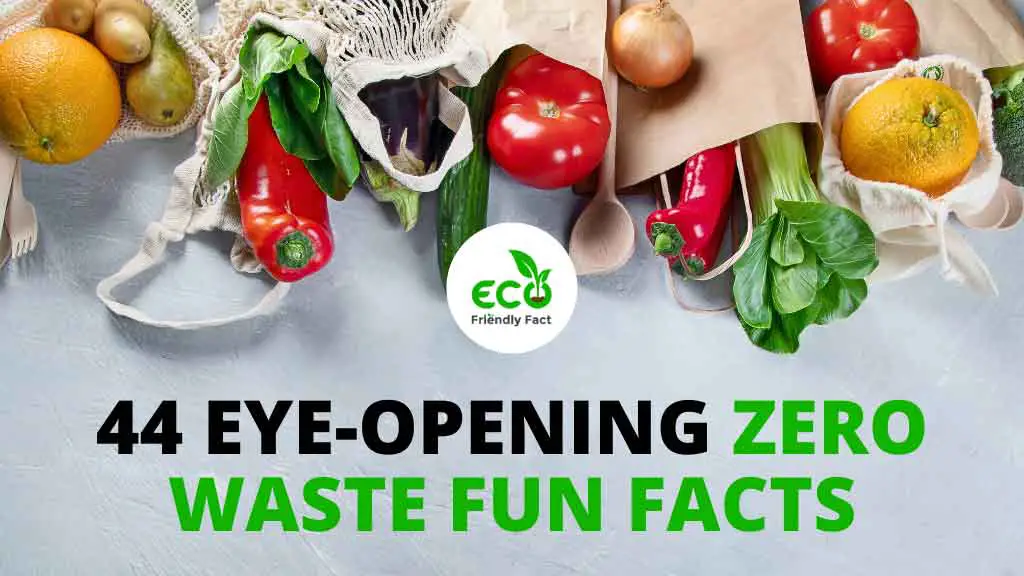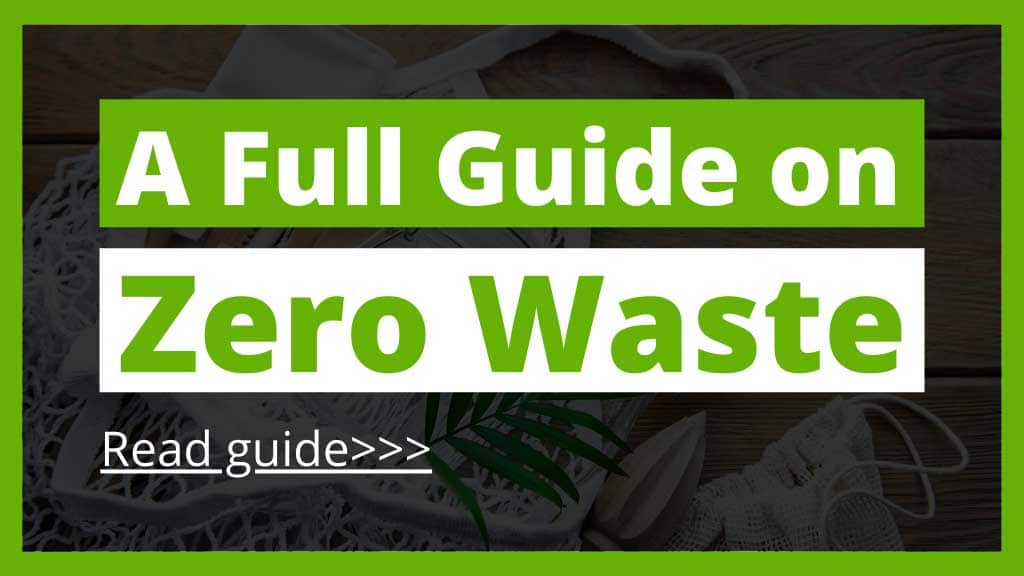The zero waste movement has been becoming popular in many parts of the world. If we don’t want to leave a world for our next generations that will have a lack of resources and mountains of wastes, there is no other way than maintaining a zero waste lifestyle. In this article, I’ll share 44 zero waste facts for the would-be zero waste practitioners.
Facts About Zero Plastic Waste
- Plastic can take up to 500 years to decompose. That means all the plastic that has been produced so far is still on this planet. Therefore saying a big no to plastic is crucial to maintain a zero waste lifestyle.
- Among the total amount of yearly plastic waste, over 146 million metric tons come from packaging. This amount is more than half of the total plastic waste. So, you can understand why does zero waste movement give so much emphasis on avoiding packaging?
- Around 300 million tonnes of plastic waste are generating every year worldwide. If we continue like this, around 12 billion metric tons of plastic will be piled up in landfills by 2050.
Another shocking fact is every year 8 million tons of plastic goes the ocean and there can be more plastic in the ocean than fish by 2050.
Only 9% of plastics are recycled. So if we don’t practice zero waste from now, it is not possible to avoid these alarming facts.
- Unlike aluminum, plastic can be recycled a few times only. Most of the plastics are recycled a maximum of twice since plastic is not durable as aluminum or glass. Therefore you cannot depend on plastic recycling and continue using it. That is why the zero waste movement discourages the use of plastic in the first place.
- We already ingest 39,000-52000 microplastic particles every year. Water, air, foods, invertebrates, fishes, crustaceans, which is plastic-free?
- The plastic industry alone can be responsible for half of the world’s total oil consumption.
- Zero waste movement has started in different cities, regions, and countries that are banning single-use plastic products.
For example, Morocco has banned plastic bags, Seattle has banned plastic utensils and straw, the City of Vancouver has proposed to ban single-use coffee cups and styrofoam containers.
- More than 30 countries have banned plastic bags regionally or across the country, Some countries have imposed taxes or fees on disposable bags.
- Zero waste supermarkets are emerging in various cities in the UK, Canada, U.S, Germany, Mexico, etc. Iceland is the first large retailer in the UK that has committed to putting an end to plastic packaging for all its brand items.
Facts About Zero Clothing Waste
- Only 15% of the total amount of used clothing is recycled. So, donating unused clothes can reduce a significant amount of landfills.
- In the United States alone, over 15 million tons of used textile waste are being produced every year.
- Wool can take up to 5 years to decompose. On the other hand, nylon (popular for swimwear, hosiery, activewear) takes and polyester takes 30-40 and 20-200 years respectively.
- Though the popularity of spandex for athletic wear is always on the rise, it is made from non-renewable resources and can take hundreds of years to decompose.
- Choosing linen and cotton (that decompose in 2 weeks and 1 week-5 month respectively), you can do your zero waste shopping.
- Rubber sole boots decompose after 50-80 years and harm the environment till then if it is not recycled. Rubber can easily be recycled into tires, inner tubes, carpet padding, etc.
Facts About Zero Food Waste
- Among the 7 billion people worldwide 925 million are starving. Every year we lose one-third of the total food production, around 1,3 billion tons of food that can be fed to 3 billion hungry people.
- Food loss and waste emit around 4,4 gigatonnes of greenhouse gasses every year.
- By recycling food scraps and wastes you can make rich soil for gardening. All you’ll need is a container with a hole, a drainage system, a lid, and food waste!
- If we can save one-fourth of the food that is currently getting lost or wasted around the world, we could feed 870 million people.
Facts About Zero Commodity Waste
- Instead of using chemical-based products for household cleaning and toiletries, zero waste practitioners choose compostable toothbrushes and or DIY toothpaste from baking soda, cocoa butter soaps, and other commodities.
- Cosmetics, beauty, and personal commodities are responsible for 120 billion packaging (plastic, cardboard, cellophane) every year. Maximum of these products come with more packaging than needed. Therefore, opting for low waste or zero waste beauty products is an important decision in the zero waste movement.
- Every year, the production of cardboard for perfume, serum, and moisturizer packaging accounts for the cutdown of 18 million acres of forest.
Zero Waste Facts About Automotive Recycling
- Around 27 million expired cars are recollected for recycling. About 80% of parts of a car can be recycled. Around the world, more than 25 million tons of material from old vehicles are recycled every year.
- Automobiles are recycled on a greater scale than any other consumer product around the world.
- In the US, car recycling is in the 16th position of the largest industry list. Around 25 billion dollars come from the car recycling industry to their national GDP. Around 100000 people are employed in the automotive recycling industry.
- The amount of steel produced yearly by the automobile recycling industry in the U.S. and Canada can be used to make around 13 million new vehicles.
- 85 million barrels of oil and 40% of ferrous metal for the scrap processing industry are saved each year by the North American automotive recycling industry.
- The huge amount of dangerous oils and fluids taken back in automotive recycling every year would be equal to the 8 Exxon Valdez oil spill of 1989, the worst oil spill disaster worldwide.
- Through automotive recycling quality auto parts are provided to the consumers that are 20%-80% less costly than the new parts.
- From junk vehicles, around 14 million tons of steel are recycled every year. 25% of a car’s body is built from recycled steel.
Beneficial Facts About Zero Waste
- When you follow a zero waste lifestyle, you’ll turn to whole foods such as fruits, nuts, veggies, etc. Avoiding food delivery or takeout you’re disallowing disposable packaging as well as saying no to processed foods.
- The zero waste lifestyle helps to grow waste-based businesses. In Toronto, composting and diversion projects provide 10 times more job opportunities than waste disposal projects do.
- A zero waste lifestyle saves a lot of money. When you’re using reusable water bottles, travel utensils, cloth napkins, menstrual cups, you’re saving a lot in the long run.
- About 20% of the total budget of a municipality is spent on waste management projects.
- Zero waste makes us feel connected to this earth. When you’ll follow zero waste, you’ll realize why we should take care of this earth.
- According to the Environmental Protection Agency, an average American throws away 4.4 pounds of trash every day. Therefore every year you alone can avoid a thousand pounds of trash from gathering in the landfills. You can also leave an impression on your family members, friends, and neighbors.
Common Misconceptions About Zero Waste Facts
- It is a common misconception that a zero waste lifestyle is expensive since you’ve to use reusable items.
You can make reusable items from the existing items. An old glass bottle can be a nice reusable water bottle. You can use an old scarf as a table napkin.
- Many people think that zero waste means you’ve to fit all the trash inside a small mason jar. But, it is not confined only to the trash jar.
Zero waste also disallows the plastic bags in which you’re bringing groceries or disposable packaging of foods or parcels.
- Going to zero waste won’t be time-consuming. Taking along a reusable plate or coffee cup while going for a get-together or camping doesn’t take much time really.
- A common myth among people is that zero waste life means you’ve to make a lot of reusable DIY items to replace single-use products.
Many growing brands are now producing zero waste products. So you don’t have to take the hassle of making DIY projects.
- Many people assume that zero waste is an old-fashioned lifestyle. Fast fashions affect our planet by discarding thousands of products every day.
However, many growing fashion brands are bringing sustainable and stylish fashion products. Moreover, thrift stores or second hand shopping is always open for you.
- Going zero waste won’t demand that you’ve to always go out prepared with reusable utensils. If you don’t come with those essentials, make sure to refuse single-use plastic as much as possible.
- Going zero waste doesn’t allow disposable packaging but it doesn’t mean you cannot get takeout food. If you crave a restaurant meal on the weekend nights, call the restaurant and say you want to pick up your takeout in your container. Hopefully, everyone will do that for you happily!
- Zero waste practices aren’t new. Our forefathers have been doing these from their times.
What Is A Zero waste Lifestyle?
Zero waste is the lifestyle where you reduce the number of materials you throw away every day and recycle material as much as possible.
Nature itself has no waste. The by-products of any natural process become the raw materials for some other processes. So, all the wastes are a result of human activities. With some small changes in our daily habits, we can go towards the goal of zero waste.
However, producing zero waste is quite impossible for us living in this modern civilization. Therefore, a zero waste lifestyle means sticking to a lifestyle that aims on reducing the daily production of waste significantly.
For a more detailed breakdown of zero waste lifestyle, follow our article on Home Zero Waste!
Why Is Zero Waste Important?
A zero waste lifestyle is important both for a healthier lifestyle and a healthier environment. This lifestyle conserves natural resources and reduces pollution making it a great factor against climate change.
It is crucial not only for saving resources and money but also for improving the lives of marginalized people in society by creating job scopes and donating good-conditioned extra commodities.
Zero Waste Movement
The zero waste movement is a lifestyle that aims to produce zero trash in everyday life. This may sound impractical in our modern society but already many countries have started this movement and have been successful to reduce waste.
The main purpose of this movement is to reduce landfill, incinerator, and ocean wastes. Landfills contaminate the soil and emit greenhouse gasses that trigger global warming. By saying no to waste, the zero waste movement aims to reduce the harmful effects of these landfills and make a healthier planet.
Benefits Of Zero Waste
From the zero waste facts we can understand that there are multiple benefits of going zero waste. Zero waste is the best solution to climate change. From production to packaging and distribution, it doesn’t affect the environment.
When you recycle or reuse the products, you conserve natural resources and save production and distribution costs of new products.
A zero waste lifestyle has some economical benefits too. When you’re maintaining a zero waste lifestyle, you’re contributing to reducing the waste management costs of your municipality. Zero waste system also creates a lot more job opportunities for people than the waste disposal systems. Moreover, the marginalized communities are being benefitted when you’re giving away your old but usable products.
Zero waste Policy
Zero waste movement follow the following policies-
- Refusing the products that you don’t need. This can include plastics and other disposable items, fast fashions, junk mails, etc.
- Reducing unnecessary commodities and giving them away to the people who need these. Reducing the use of chemicals, household cleaners, cosmetics, etc.
- Reusing the things that still can be used.
- Recycling the materials as much as possible.
Conclusion
Changing your lifestyle is not an easy goal especially when you’re turning to a zero waste lifestyle. But every time you’ll use disposable products or buy items with disposable packaging just remember your single initiative can be a part of a greater good. Hopefully, these zero waste facts will make you realize why we should go for it from now on.

















